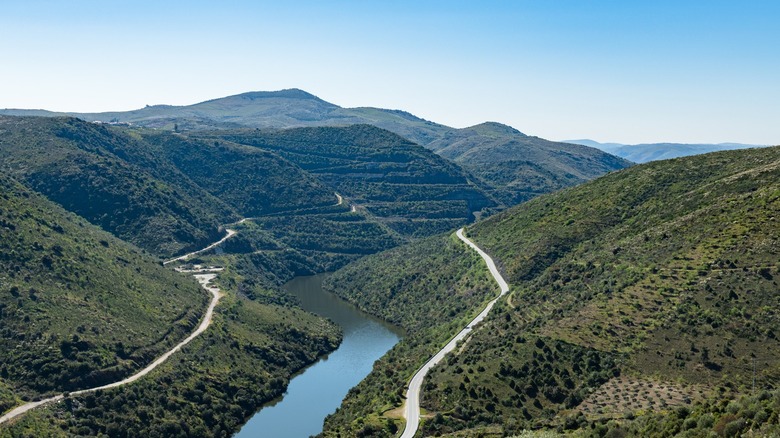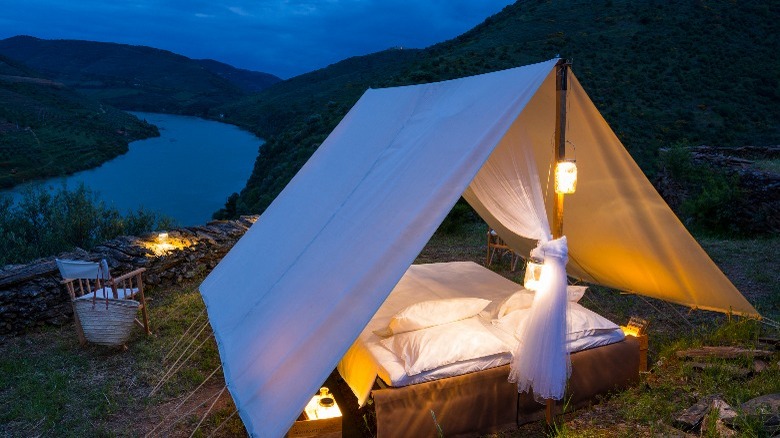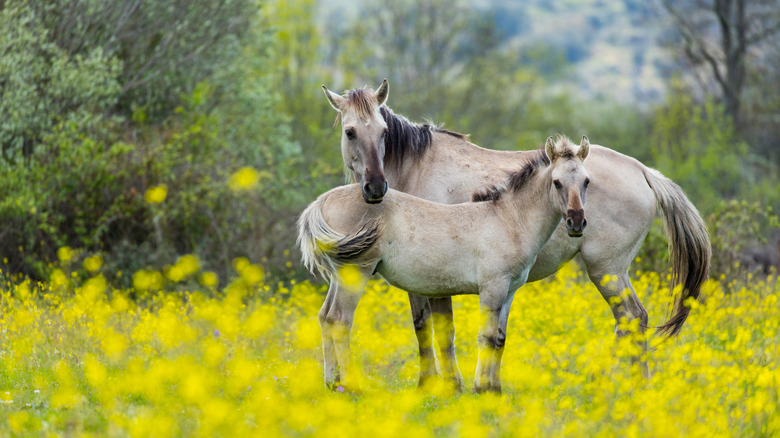Reconnect With Nature At This Stunning European Destination
There is no getting away from the fact that we are in the midst of an ecological crisis. With wildlife populations experiencing an average decline of almost 70% in the last 50 or so years (via World Wide Fund For Nature) — and around a million animal and plant species now at risk of extinction — the situation couldn't be more serious. So, it's always heartening to hear of international projects trying to turn things around — and few can be more inspiring than that of the Greater Côa Valley in Portugal.
Located in the north of the country, close to the Spanish border, this sprawling region is home to one of the greatest examples of rewilding in Europe. To date, more than 100,000 hectares of this ruggedly beautiful landscape, characterized by oak forests, river gorges, and granite cliffs, have been earmarked for conservation. And it's already yielding results. Among the species now starting to thrive here are the Iberian wolf, wild boar, red deer, and roe deer, as well as eagles and vultures, to name but a few.
Furthermore, as tourism through rewilding is a key tenet of the project, respectful visitors are very much welcome here. So, if you've been feeling the urge to get off the grid and reconnect with nature in a stunning setting, then the Greater Côa Valley might just be the place for your next trip.
From ancient art to Iberian wolves and wild horses
First, though, it helps to understand a bit about the background of this pioneering rewilding project. Found between the Douro River in the north and the Malcata mountain range in the south, this rich landscape has long been a draw to both humans and wildlife. In fact, there are numerous engravings here dating back thousands of years. These can be seen at the Côa Valley Archaeological Park, one of the most important open-air sites for Palaeolithic art, which is a UNESCO World Heritage Site.
Latterly, the region became known for its small landholdings, a place where farmers would eke out a living through agriculture. But, over time, much of the land was abandoned as people departed for more fertile areas or the cities. This had the secondary outcome of creating a greater risk of wildfires caused by the overgrown scrub. Meanwhile, overhunting decimated populations of native predators, causing problems in the food chain, and harming the wider ecology.
But then, a few years ago, something important happened. The landscape was chosen by Rewilding Europe as one of 15 major sites currently being rewilded. The turnaround has been dramatic. Now, wild Sorraia horses and Tauros keep the scrub in check; griffon vultures soar high above; and Iberian wolves are starting to gain a foothold again. Where once the ground was dominated by dense scrub, now biodiverse mosaic landscapes help to create open spaces that reduce the risk of fire.
The many benefits of nature-positive tourism
The other important thing about this project is that the local communities here have not been forgotten either. As Rewilding Europe outlines on its website, the aim was always to create "a place where the recovery of wild nature is now working to revitalize culture, communities, and local commerce." So, the people of the region are very much at the heart of the activities, too.
For example, one of the first steps was to create a network of sustainable tourism and eco-businesses offering excursions, guides, and accommodation. Then, in late 2021, a new rewilding center was opened in the village of Vale de Madeira. As well as providing a venue for exhibitions, meetings, and other events, this multi-functional space offers its own lodgings. It also showcases local rewilding efforts and helps to promote nature-positive tourism across the region. Then, in 2023, a new arts festival, the CÔA (Corridor of Arts), was launched, aiming to connect people and nature through art.
Looking to the future, aside from the benefits to local people, it is hoped that the Greater Côa Valley could go on to become one of the most important migration routes for wildlife in the Iberian Peninsula. This is just one more reason to support the groundbreaking venture. Certainly, it's hard to think of a more ideal destination for the eco-conscious adventurer than this oft-overlooked corner of Portugal.


